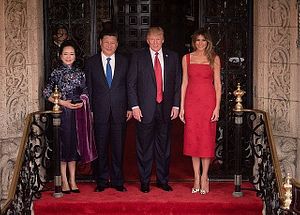One should never underestimate Donald Trump. He has more or less singlehandedly (granted, speaking for the 62 million who voted for him) undermined U.S. influence in the world and created a global power vacuum that other nations feel compelled to try and fill. He has Europe scrambling to defend itself on its own. (In Chancellor Merkel’s diplomatic terms, “The times in which we could completely depend on others are on the way out.”) Twenty-three European countries just agreed to form, in effect, a NATO of their own. The Saudi King, of all people, is following Israel’s pilgrimage to Moscow, as Russia is becoming a major player in the Middle East. And China finds itself stuck in the role of a global power, a role it is not quite ready or willing to undertake.
True, there were some commentators in the West who long argued that China was out to “eat our lunch” and dominate the world. They made much of small potatoes such as Chinese submarines venturing into the Indian Ocean and the opening of a Chinese naval base in Djibouti, in the Horn of Africa, and a Chinese shipping port in Sri Lanka. They saw a major power grab in every second Chinese investment overseas or trade deal, ignoring the fact that such economic ties rarely by themselves make for domination. However, Trump’s retrenchment is putting some foundation under the castles in the sands built by those threatened by China. This does not mean that China is about to dominate the world or even form a new set of global institutions and norms. However, it will have significantly more influence in world affairs than most expected it to have just a year ago.
Take trade. At least since 1945 the U.S. has considered promoting free trade as a key element of the liberal international order. True, trade was never fully liberated from various state controls and interventions, but the U.S. supported – quite effectively – a curtailing of such tariffs and quotas and thus made trade freer. Trump famously abhors free trade and canceled the Trans-Pacific Partnership. So Chinese President Xi Jinping stepped in and declared himself the champion of free trade, and now China is negotiating with some 16 countries to form a free trade zone, without the U.S.
Take climate. Trump announced the U.S. would pull out of the all-important Paris climate accord. Then Europe – and China – committed themselves to continue advancing the Paris Agreement’s goals – as a common good. And China is investing heavily in changing its own industries to reduce pollution, a model for other nations to follow.
Not often reported is that China has greatly increased the number of troops it provides to the UN Peacekeeping force, and now ranks among the top 12 nations in personnel contributions. Further, with respect to spending on humanitarian aid and development, China now rivals the most generous Western nations – it spent roughly $350 billion from 2000-2014 on projects and assistance in myriad nations, including Argentina, Angola, Kazakhstan, and Cambodia. And it established the Asian Infrastructure Investment Bank (AIIB), which several Western nations joined, despite the fact that the U.S. spurned the AIIB.
A closer look at the same developments reveals, first of all, that they are benign in the sense that they fit quite comfortably into the prevailing international order rather than upending it. One further notes that Xi couches China’s new global presence in rather carefully crafted and limited terms. For instance, he stated that by the middle of the 21st century, China would become “a global leader in terms of composite national strength and international influence.” This is hardly an attempt to grab power during the Trump era or a claim that comes anywhere near Nikita Khrushchev’s “We will bury you.”
Moreover, there is no sign here that China is willing to take over the responsibility of ordering the world. There is no indication that it will send its warships to enforce freedom of navigation (essential for its well being, as it must have a steady flow of energy and raw materials from other parts of the world) – the way the U.S. does. There is little reason to believe that if some country invades another in a faraway part of the world, China will step in to uphold the Westphalian sovereignty principle, as the U.S. did when Iraq invaded Kuwait, or that China will act to stop ethnic cleansing, as the U.S. did in Kosovo. Indeed, until a year ago, in private meetings Chinese officials scoffed at America’s willingness to put its young people in harm’s way and spend trillions on nation building in the Middle East. Now the Chinese seem to be cautiously feeling their way as they are thrust into a more global presence following U.S. retrenchment. They may well conclude that the cost is too high and the gains too few to take on the burdens of maintaining the global order, though they are already (as we have seen) lending a shoulder here and there.
The net result is that for the foreseeable future one should expect less global order rather than China stepping in to replace the U.S. as the major source of that order.
Amitai Etzioni is a University Professor and professor of international relations at The George Washington University. He is the author of Avoiding War with China, published by University of Virginia Press.

































